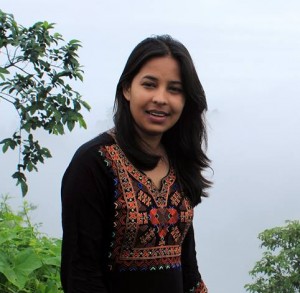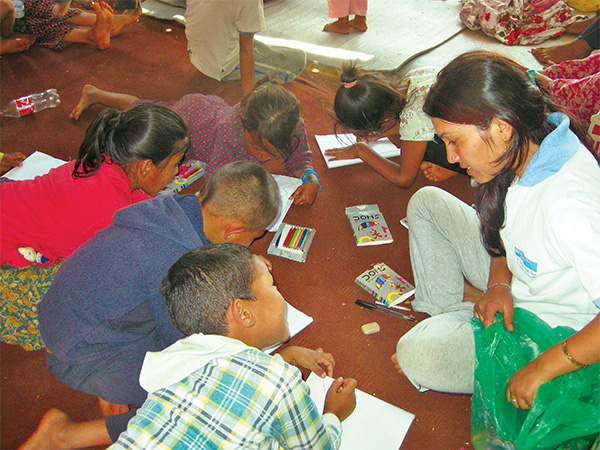And then there was teaching which she chose to forget her pains, and resolve her psycho-social problem. “While I was idle, thoughts of damaged house, shop, studies, mother and brothers always used to come into my mind. Such thoughts adversely affected my health as well,” she recalled. “Wherever I looked at, I found similar plight of many people. Then I decided to deviate my mind to something that would help me forget my troubles. Finally, I decided to teach children.

This is the translated story, that was originally written in Nepali language and published in Kosheli edition of Kantipur Daily. Click here to read the Nepali story in Kantipur.
After the monstrous earthquake of April 25 left them devastated, Sarita’s four-member family is now forced to live in a temporary shelter at Tundikhel of Chautara in Sindhupalchowk district. Although five persons can comfortably live in a tarp provided by a foreign aid agency, twenty persons from four families, including hers, are to live together under the tarp awkwardly. Anyone visiting them can easily figure out hardship of their life in a small tent.
Sarita wakes up early in the morning, cooks for her family at a corner of the tent, and leaves for another temporary shelter nearby with a bag of copies and pen at around 9:30 am. By the time she reaches a temporary learning space created by Save Our Soul (SOS), children of quake-hit families from Chautara are already there waiting for her.
Over a hundred children of displaced families living in temporary shelters at Chautara and Tundikhel attend the learning center. Though it is an emergency class, it starts formally with the national anthem ‘Sayaun Thunga Phoolka Hami Eutai Mala Nepali’ from 10 am and ends at 5 pm. Four volunteer teachers engage children of grades ranging from nursery to five in fun activities like drawing and games. Sarita is one of them.
Sarita is neither a teacher by her profession nor had she wished to be a teacher someday. The student, pursuing her Bachelor of Arts (BA), used to run a grocery before the earthquake. However, the earthquakes of April 25 and May 12 have changed her daily lives.
Following the death of her father some years ago, Sarita, the eldest child in the family, had to bear the responsibility of managing home. Even her mother, after her husband’s death, had to struggle to raise a daughter and two sons and educate them. They possessed the only property ‘house’, where they had starting a shop. The family used to live on a handful income generated from the shop. They lived a simple life and their lives were gradually improving, but the earthquake ruined them all of a sudden.
“The sudden quake left us back to the poor life of early days,” said Sarita, whose eyes filled with tears. She could not utter any word for a while. The only property was a house, while the shop was the only source of income for the family. The earthquake destroyed them.
“Where to go? What to do? How to manage fees for my education and also of my brothers? How to rebuild our houses. Worried over all these problems, my mother fell sick,” she further said. “We could not even brought out the valuables and goods from the shop before our house reduced to rubble in the earthquake.” With the deteriorating health of her mother thereafter, she was also worried over how to cope with the situation. “Later I also felt like a sick person,” she added.
And then there was teaching which she chose to forget her pains, and resolve her psycho-social problem. “While I was idle, thoughts of damaged house, shop, studies, mother and brothers always used to come into my mind. Such thoughts adversely affected my health as well,” she recalled. “Wherever I looked at, I found similar plight of many people. Then I decided to deviate my mind to something that would help me forget my troubles. Finally, I decided to teach children.
She has been teaching quake-affected children since the fourth day of the April 25 earthquake. For her, teaching was not a difficult task because her love for children, she told me.
By the time I was talking to her, the clock had already struck at the noon. Then I saw three of children, approaching to Sarita, told her, “Sarita Miss, Sarita Miss, give us drawing papers.” She handed over a paper and pen to each child. It was the time to draw.
“Miss, which picture should I draw?” said one of the girl children. Sarita was quick to respond her, “Draw a picture of a house.” Sitting nearby her teacher, she started drawing. First she drew a house that stood intact, then another damaged house. After that, he wrote ‘before’, on the top of the first house, and she wrote ‘after’ on the top of the second. Finally, she showed the pictures to Sarita. The pictures that her student drew and showed to her once again reflected her damaged house in her mind.

According to her, most of children from Sindhupalchowk have similar feeling after the earthquake. “If it is difficult for a 25-year old girl like me to forget such catastrophe, how much has the quake terror traumatized children?,” she questioned.
She complained about the government’s apathy to address the psychosocial impact on children even after a month of the earthquake.
When and how can children in trauma after the earthquake can overcome them?, she questioned, urging the government to understand the need of psychosocial counselling before their classes resumed.
Now she enjoys a new experience of her hobby that has changed due to the earthquake. “I want to pursue my interests in teaching quake-affected children for some time,” she said. “However, there is no destination of our life now. No place to live and go further.”
“I rushed out of home in a pair of clothes at the time of earthquake. I do not have additional dresses to change. I wear the same dirty clothes and go to teach children,” she further said.
She says, whenever she goes near the children, she forgets her dirty clothes that she is wearing and the destroyed house.
I wonder how many generous people like Sarita could be in our society, who devoted herself to teach quake affected children even after losing all her properties in the earthquake.
—
The author is an investigative multimedia journalist. For the investigative reporting in Nepal, she was awarded an investigative reporting prize by International Center for Journalists (ICFJ) in 2014. Currently, she is reporting on investigative reports and news stories with focus on migration or foreign employment of Nepalis, violence against women, and good governance in Nepal to be published in different media.
Recently, she has completed my assignment of producing and presenting radio magazine Nikash for Equal Access Nepal which was focused on transitional justice. Before that, she worked as producer and presenter of Sarangiko Bhalakusari for the BBC Media Action. Sarangiko Bhalakusari is a Nepali radio magazine produced by BBC Media Action.